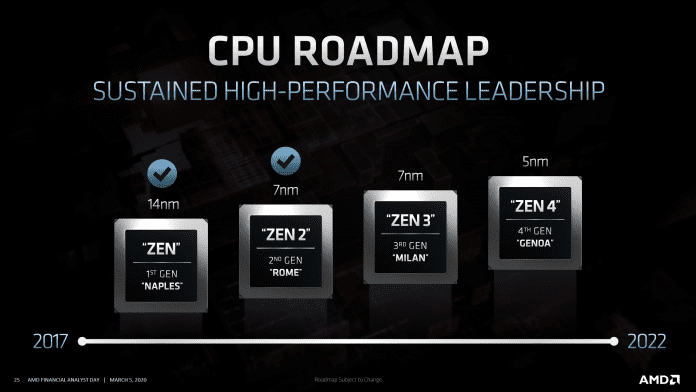AMD Zen 3 release date, specs and price everything know
AMD simply surprised everyone in 2019, with its launch of 7nm Zen 2 design for its processors presenting it with significant advancement in performance and making it a major business share. And, while Zen 2 is still operating strong, it may now time to begin looking at what AMD has in shelf with Zen 3.
AMD released its Zen 2 architecture at CES 2019 last January and then unveiled the Ryzen 3000 processors, which are built on the Zen 2 design, at Computex 2019 the following May.
AMD has been enjoying a good run with the Ryzen processors and has made recognition for its most recent Ryzen 3000 series processors. In the tech business, everyone is anticipating the next greatest thing, and in the case of AMD customer desktop chips, that means the Ryzen 4000 family.
Not to be mixed with the Zen-2 based Ryzen 4000 mobile processor family that formally announced last month Ryzen 4000 desktop CPUs are built on the latest AMD new Zen 3 microarchitecture. A new leak also claims that we won’t be able to see these processors until October 2020.
This information follows up with AMD’s past statements about the coming of the new Zen 3. AMD would not perpetrate to the precise launch date but was resolute that it’s Ryzen 4000 client processors would roll out by the end of 2020. There is so much haste for the AMD to get these Ryzen 4000 chips to store, as it’s Ryzen 5 3600 allows good hit for the buck with a sale price of $160, while its 12-core/24 thread Ryzen 9 3900X and 16-core/32 thread Ryzen 3950X are still overwhelming at the high end of the user desktop CPU business.
AMD Zen 3 release date
AMD Ryzen 3rd gen chips have taken over the globe, passing multi-core performance, unlike anything we’ve observed previously in the mainstream market. But, AMD isn’t going to lie idly by.
We didn’t get a peek at any special AMD Zen 3 specs at this event – surpassing the time that it must use 3D chipset piling in prospective designs – but it’s a subtle reassurance that AMD isn’t resting on its laurels while it enjoys its newfound authority status in the desktop CPU market. This is particularly fresh, of course, as we were, in the beginning, anticipating to see AMD Zen 3-based AMD Ryzen 4000 processors for desktop make their appearance at CES 2020, but due to coronavirus outbreak in the whole, all tech companies have postponed their launches.
This is a bit of a double-edged knife, however, because it does mean that we could be waiting until October to view new desktop processors from AMD emerge, providing it with the most large-scale gap between AMD Ryzen processors we’ve seen until now. Still, AMD held a minute to boast that it’s shipped more than 200 million Zen Cores since first-generation Ryzen hit the roads, so we’re sure AMD is excited to get more processors to market.
Either way, the fact that we know AMD Zen 3 processors will be hitting the stores by March next year is remedial, even if AMD didn’t support narrow the glass any further. AMD will share Zen 3 availability knowledge when it’s ready, so until then we’re just going to have to wait.
AMD Zen 3 price
We don’t have any clue to assume that processors built on the Zen 3 architecture will be valued any distinctly than their Zen 2 counterparts. Given that expectation, it is helpful to consider the costs of AMD’s Zen 2 processors.
If the process used to manufacture Zen 3 processors proves to have greater yield or better performance, it is possible that AMD even lower its prices. That would retain the competition with Intel fierce, but AMD already has a powerful price lead against Intel and may not require to go lower.
AMD Zen 3 specs
We learned in mid-2019 that AMD had already completed the Zen 3 design, which is supposed to be based on a 7nm+ process, allowing some slight enhancements on the existing 7nm process found in Zen 2 hardware. This new architecture is assumed to be the result of a shift to 7nm EUV (extreme ultraviolet) lithography. That should provide for a potential 20% improvement in transistor density while reducing energy loss by 10%.
The improved 7nm+ process would also allow new chips more eminent clock rates while keeping lower power consumption. The new processor may also come with an 8% to 10% increase in IPC (instructions-per-clock). Excelling that off, rumours have suggested that AMD will introduce a new level of synchronous multithreading in Zen 3 chips that would provide a single core to manage four threads (e.g., a 4-core/16-thread CPU or a 16-core/64-thread CPU).
Even more, the cache is apotential upgrade we could observe in Zen 3-based processors. AMD cinched Ryzen 3000 processors with cache, and that plenty of extra fast memory may have played a important part in the best gaming performance across the board for Ryzen 3000 processors.
While we may be seeing at enhancements to DDR5 RAM and PCIe 5.0 support further down the line with Zen 4, we have no evidence that Zen 3 will move away from DDR4 and lately introduced PCIe 4.0 standard.
Collectively, we should be seeing at Zen 3-based processors with raised clock speeds matched with raised IPC for a adequate performance boost (especially in multithreaded workloads) over their Zen 2 counterparts all while staying indoors or below the power resources of their predecessors. The potential to keep high performance while reducing the energy budget could be particularly promising for mobile applications.




